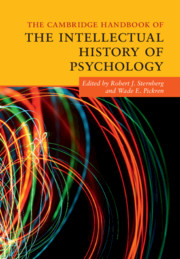Book contents
- The Cambridge Handbook of the Intellectual History of Psychology
- The Cambridge Handbook of the Intellectual History of Psychology
- Copyright page
- Contents
- Figures
- Tables
- Contributors
- Introduction
- 1 Major Paradigms and Approaches in Psychology
- 2 Methodology in Psychology
- 3 Neuroscience in Psychology
- 4 Sensation and Perception
- 5 Attention: Awareness and Control
- 6 Learning
- 7 Memory
- 8 Decision-Making
- 9 Creativity
- 10 Intelligence
- 11 Development
- 12 Social Psychology
- 13 Gender
- 14 Emotion
- 15 Motivation
- 16 Personality
- 17 Abnormal Psychology
- 18 Psychotherapy
- 19 Health Psychology
- Index
- References
6 - Learning
Published online by Cambridge University Press: 18 May 2019
- The Cambridge Handbook of the Intellectual History of Psychology
- The Cambridge Handbook of the Intellectual History of Psychology
- Copyright page
- Contents
- Figures
- Tables
- Contributors
- Introduction
- 1 Major Paradigms and Approaches in Psychology
- 2 Methodology in Psychology
- 3 Neuroscience in Psychology
- 4 Sensation and Perception
- 5 Attention: Awareness and Control
- 6 Learning
- 7 Memory
- 8 Decision-Making
- 9 Creativity
- 10 Intelligence
- 11 Development
- 12 Social Psychology
- 13 Gender
- 14 Emotion
- 15 Motivation
- 16 Personality
- 17 Abnormal Psychology
- 18 Psychotherapy
- 19 Health Psychology
- Index
- References
Summary
At the end of the nineteenth century, Darwinian interests in animal behavior converged with experimental psychology to give rise to systematic research on learning in animals. For the first half of the twentieth century, Ivan Pavlov’s study of conditioned reflexes was a major influence, but many American researchers maintained the behaviorist claim that all learning is based on stimulus–response (S–R) habits. A major critic of this dominant tradition emphasized spatial learning, suggesting that conditioning procedures produce expectancies rather than habits. Another kind of attack on S–R theory concentrated on its claim that learning processes were the same for all species. The comparative approach investigated ways in which, for example, the learning capacities of primates differed from those of rats or even goldfish. Other researchers investigated biological constraints on what animals can learn and the way that learning depends on a researcher’s choice of stimuli and responses, as in the study of conditioned taste aversions. Several key discoveries in the late 1960s laid the foundations for new associative theories of learning and a revival of interest in cognitive processes like attention. These approaches, together with breakthroughs in research on neural bases of behavior, have dominated research on animal learning ever since.
- Type
- Chapter
- Information
- The Cambridge Handbook of the Intellectual History of Psychology , pp. 135 - 164Publisher: Cambridge University PressPrint publication year: 2019
References
- 1
- Cited by

